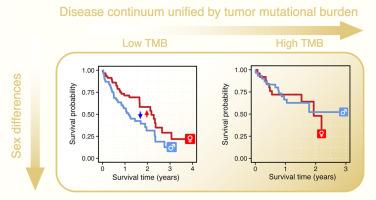通过肿瘤突变负担统一的疾病连续体中免疫检查点抑制剂的性别差异反应
IF 2.5
3区 医学
Q2 ONCOLOGY
引用次数: 0
摘要
虽然免疫检查点抑制剂(ICIs)在晚期非小细胞肺癌(NSCLC)中的疗效已得到证实,但基于性别的治疗反应差异仍未得到充分探讨。本研究探讨了性别差异如何影响晚期NSCLC的ICI治疗结果,重点关注肿瘤突变负担(tumor mutational burden, TMB)在这些差异中的作用。本研究分析了174例晚期(chemotherapy-naïve) NSCLC患者接受ICIs治疗的数据,包括PD-1/PD-L1和CTLA-4抑制剂,以评估治疗反应和生存结果的性别差异。低TMB (<10 mut/Mb)的男性患者治疗反应较女性患者差。相比之下,在高TMB患者中没有观察到性别差异,其中两性表现出相似的治疗反应。这些结果表明,高TMB可能会降低性别对ICI疗效的影响,男性和女性患者的结果相当。此外,在低TMB患者中,疾病进展和总生存期的性别差异更为明显,强调了TMB在调节免疫治疗结果的性别相关差异中的作用。这项研究强调了将性别和TMB纳入精确肿瘤学的重要性。高TMB似乎使两性之间的治疗反应相等,而低TMB可能需要更个性化的治疗策略,特别是对于男性患者。进一步研究这些差异背后的生物学机制对于优化ICI治疗和提高患者预后至关重要。将性别和TMB纳入临床决策将有助于开发更有针对性和更有效的癌症免疫疗法。本文章由计算机程序翻译,如有差异,请以英文原文为准。

Sex-differential responses to immune checkpoint inhibitors across the disease continuum unified by tumor mutational burden
While the efficacy of immune checkpoint inhibitors (ICIs) in advanced non–small-cell lung cancer (NSCLC) is well-established, sex-based differences in treatment responses remain insufficiently explored. This study examines how sex disparities impact ICI treatment outcomes in advanced-stage NSCLC, focusing on the role of tumor mutational burden (TMB) in these differences. This study analyzed data from 174 advanced-stage, chemotherapy-naïve, NSCLC patients treated with ICIs, including PD-1/PD-L1 and CTLA-4 inhibitors, to assess sex differences in treatment response and survival outcomes. Male patients with low TMB (<10 mut/Mb) had worse treatment responses compared to female patients. In contrast, no sex differences were observed in patients with high TMB, where both sexes exhibited similar therapeutic responses. These results suggest that high TMB may reduce the impact of sex on ICI efficacy, with male and female patients showing comparable outcomes. Furthermore, sex disparities in disease progression and overall survival were more evident in low-TMB patients, emphasizing the role of TMB in modulating sex-related differences in immunotherapy outcomes. This study highlights the importance of incorporating both sex and TMB into precision oncology. High TMB appears to equalize treatment responses between sexes, while low TMB may necessitate more personalized treatment strategies, particularly for male patients. Further research into the biological mechanisms underlying these differences is essential to optimize ICI therapies and enhance patient outcomes. Integrating both sex and TMB into clinical decision-making will help to develop more tailored and effective cancer immunotherapy.
求助全文
通过发布文献求助,成功后即可免费获取论文全文。
去求助
来源期刊

Seminars in oncology
医学-肿瘤学
CiteScore
6.60
自引率
0.00%
发文量
58
审稿时长
104 days
期刊介绍:
Seminars in Oncology brings you current, authoritative, and practical reviews of developments in the etiology, diagnosis and management of cancer. Each issue examines topics of clinical importance, with an emphasis on providing both the basic knowledge needed to better understand a topic as well as evidence-based opinions from leaders in the field. Seminars in Oncology also seeks to be a venue for sharing a diversity of opinions including those that might be considered "outside the box". We welcome a healthy and respectful exchange of opinions and urge you to approach us with your insights as well as suggestions of topics that you deem worthy of coverage. By helping the reader understand the basic biology and the therapy of cancer as they learn the nuances from experts, all in a journal that encourages the exchange of ideas we aim to help move the treatment of cancer forward.
 求助内容:
求助内容: 应助结果提醒方式:
应助结果提醒方式:


